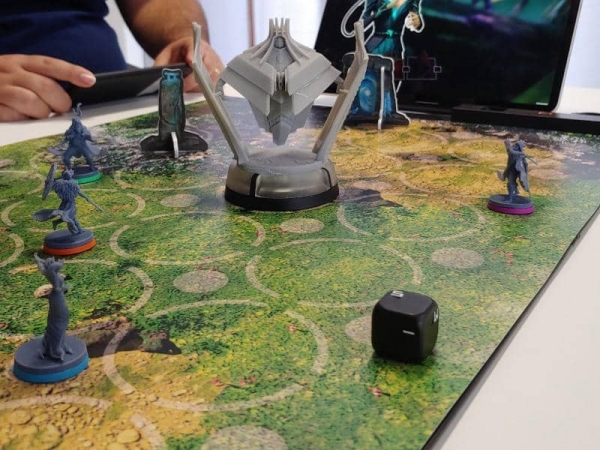Mixing digital tools with analogue games isn't for everyone. Many of us in the modern hobby games community prefer to switch off our smartphones, get away from our computer monitors or otherwise "disconnect" and instead spend some quality time with people face-to-face, playing together. Some of us are happy to compromise and allow apps or other digital tools to take part in game nights, at least to some extent. In this article, I want to look at some of this new technology and what it can add to the playing experience.
First of all, let me say that I'm not going to talk about digital versions of board games, which I think is obvious. I also don't want to discuss games that come with some sort of app or other smartphone integration out of the box. That's for a different article or maybe even a full-blown review. That leaves digital board game tools that have no direct connection to the game we're playing, but that we happily use nonetheless.
Supporting Tools
One app I now use all the time is BG Stats. The app is available on most modern smartphones and many much older ones too. It not only allows you to keep track of your board game collection, synching with Board Game Geek if you want it to, but also record plays. It's pretty easy to use and works offline, synching everything back to BGG or cloud storage when you have internet again.
You can quickly check how many games you played recently, who scored the highest for every game, with whom you played and who wins the most, see if you're beating your own high score, look at charts and just generally nerd out on all the stats. BG Stats can also randomly decide the first player or choose a game from those you haven't played in a while. It's incredible how much this app offers without you having to pay a dime. However, once you do pay, you get access to a lot more functionality.
If you want to balance cold figures with something warmer, then why not add a fitting soundtrack to your game night experience. Melodice is a search engine where you look for a game and it returns a suitable playlist. I don't know how many games the website contains, but so far I have not been disappointed. Don't expect the latest games to be there, but you can always add more.
Some playlists are a bit odd, but the majority are really atmospheric and help you immerse yourself a little bit deeper into the game's setting. Even if you don't like some of the songs, there should be enough there for you to enjoy. Just skip those tracks you don't think fit the game.
Learning and Playing
If you're the sort of person who likes to start playing as quickly as possible and with as few rules overhead as necessary, then Dized is one to check out. It's an app which walks you through the setup of a game and then gets you to start playing, while teaching you the rules. It's very much like how digital adaptions of board games work. You're asked to take certain actions and the app explains what happens next. You basically learn the game as you go along. Once all the rules have been taught, you can finish the game without the need of the app. It's really easy and a great way to teach a game to friends or family, especially if you're not confident in your own teaching abilities.
The app also requires a subscription and I'm not sure how frequently or quickly new games are added. So you probably want to check the list on their website and then go from there so you can be sure it's for you and offers tutorials for the games you want to play. However, Dized is certainly a pretty hassle-free way of learning a new game or introducing it to others.
 Overlay Teburu with your own game map, add figures with bases that transmit information and use Teburu's dice to track results
Overlay Teburu with your own game map, add figures with bases that transmit information and use Teburu's dice to track results
If you're after technology that intrinsically integrates with your games, then Teburu is a contender. At its core, it is a blank board with embedded technology, onto which you place the game's map, tiles or other things that represent the central playing area. The board tracks figures, which have RFID chips and magnets in them. It can also track dice, which are wireless and contain their own circuitry to transmit the rolled results back to Teburu. You can even add custom bases with LEDs to the figures and then the game can relay important information in real-time.
In fact, Teburu evaluates dice results, tracks player health and other stats and generally does all the housekeeping in real time. It can explain the setup and teach the rules as you play, similar to Dized. With the right software, it can even become an AI opponent.
What About You?
That's all the digital board game tools I can think of. I hope I have offered a good variety, even if I only covered each one very briefly. Have you used any of the tools I described in this article yourself? What did you think? Are there any others that you can think of that I didn't list? As always, please share your thoughts and experiences in the comments below. I'd love to hear from you.
 Games
Games How to resolve AdBlock issue?
How to resolve AdBlock issue? 
















